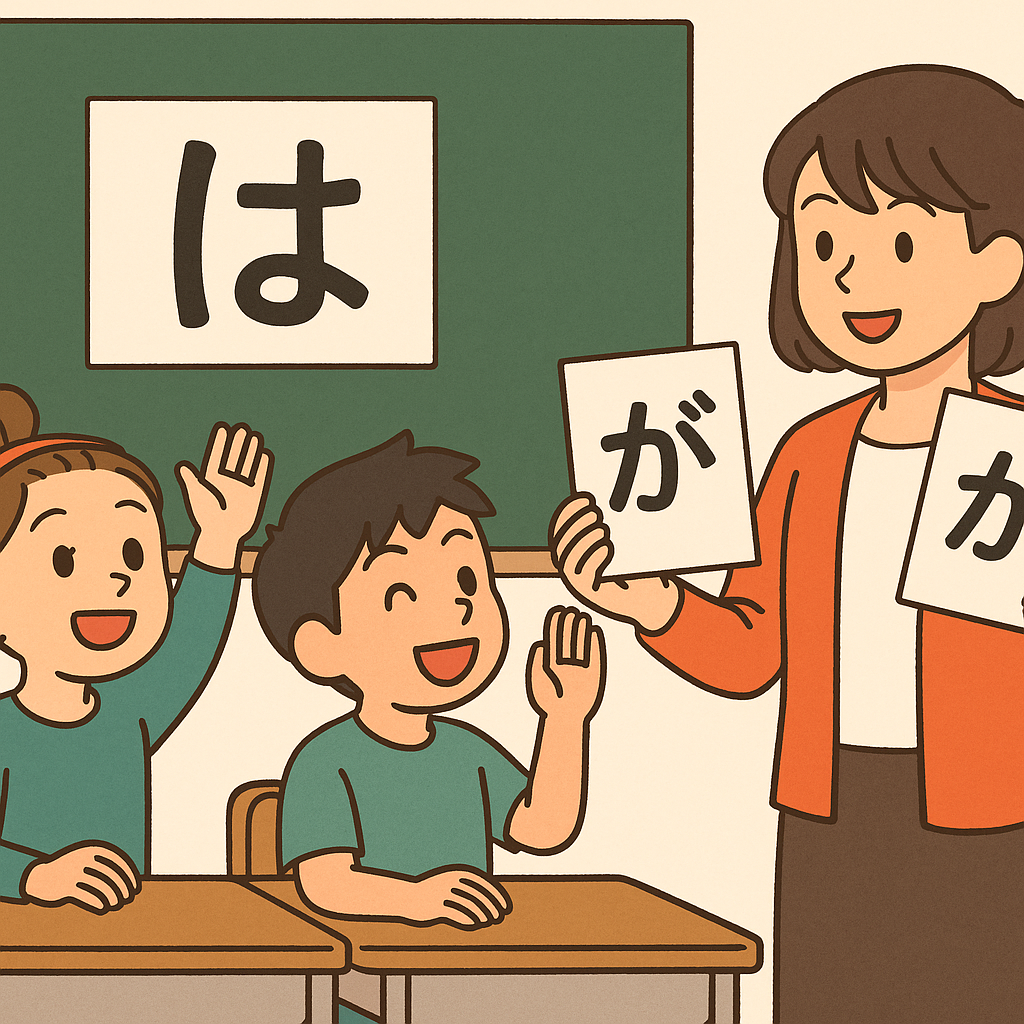
はじめに / Introduction
日本語学習を始めた人が最初にぶつかる大きな壁のひとつが、「は」(wa)の使い方です。
「は」は日本語の会話、作文、読解すべての場面で欠かせない助詞であり、英語や他の言語にはない特徴があります。
初心者にとっては「どうやって使えばいいの?」「『が』との違いは?」と疑問に思うことも多いでしょう。この記事では、「は」の役割やコツ、よくある間違い、実際の会話例やクイズ、そして楽しいイラスト例までたっぷり紹介します!
For people just starting to learn Japanese, the particle "は" (pronounced "wa") is one of the first big hurdles.
"は" is used everywhere--in conversation, writing, and reading. It’s a special particle unique to Japanese, not found in English or many other languages.
Beginners often wonder, "How do I use it?" or "What’s the difference with ‘が’?" In this article, we’ll cover what "は" does, how to master it, common mistakes, sample conversations, a quick quiz, and even some fun illustrations!
「は」の正体 / What Exactly Is "は"?
「は」は日本語文の「テーマ(話題)」を示す助詞です。「私は学生です」なら、「私」について話すという意味になります。英語では "as for…" や "speaking of…" に近い感覚です。
例えば「猫はかわいいです」なら、「猫について話します→猫はかわいい!」という流れです。
"は" is a particle that marks the "topic" of a sentence. In "私は学生です" ("Watashi wa gakusei desu"), it means "Let’s talk about me--I am a student." In English, it’s similar to "as for…" or "speaking of…".
For example, "猫はかわいいです" ("Neko wa kawaii desu") means, "Let’s talk about cats--cats are cute!"

「は」の使い方と例文 / Basic Uses & Examples
基本の形は「AはBです」。Aが話題、Bが説明や情報です。
例:
・私は日本人です。
・これはペンです。
・田中さんは先生です。
・今日(きょう)は暑いです。
「は」は必ずしも主語に使うとは限りません。テーマなら何でもOK!
The basic pattern is "A wa B desu." A is the topic, B is the explanation or information.
Examples:
・Watashi wa nihonjin desu. (I am Japanese.)
・Kore wa pen desu. (This is a pen.)
・Tanaka-san wa sensei desu. (Mr. Tanaka is a teacher.)
・Kyou wa atsui desu. (Today is hot.)
"は" doesn’t always mark the subject--any topic is fine!
発音のヒント / Pronunciation Tips
助詞の「は」は「わ」と発音します。「はな(花)」や「はし(橋)」は「ha」ですが、助詞だけ特別に「wa」と読むので要注意!
例:「私は…」→「わたしわ」
このルールを知らずに「Watashi ha」と言うと、日本人に違和感を持たれることもあります。
The particle "は" is pronounced "wa." Words like "hana" (flower) or "hashi" (bridge) use "ha," but only as a particle it’s "wa."
Example: "Watashi wa…" (not "Watashi ha…").
If you forget this and say "ha," it will sound strange to Japanese speakers!
「は」と「が」の違い / "は" vs. "が": What’s the Difference?
「は」はテーマ、「が」は新しい情報や強調、主語を表します。
例:
・「私は学生です」= 私について話す
・「私が学生です」= 「学生」は誰?それは「私」だと強調
使い分けは非常に奥深く、日本人同士でも難しいことがあります。
"は" marks the topic, "が" marks new or emphasized information, often the subject.
Examples:
・"Watashi wa gakusei desu." = Topic is "me."
・"Watashi ga gakusei desu." = Who is the student? "I am." (emphasis)
This difference is subtle, even for native speakers!
さらに、「が」は疑問文や感情の表現、自然現象(「雨が降る」など)にもよく使われます。
"が" is also often used in questions, emotional expressions, or to mark natural phenomena ("Ame ga furu"--It rains).
会話での「は」の使い方 / "は" in Real Conversation
会話では「は」を使って相手との共通の話題を作ったり、話題を切り替えたりします。
会話例1:
A:さくらさんはどこから来ましたか?
B:私は韓国から来ました。
会話例2:
A:今日は天気がいいですね。
B:そうですね。私は散歩が好きです。
In conversation, "は" is used to introduce a topic or change the subject.
Dialogue 1:
A: Sakura-san wa doko kara kimashita ka? (Where are you from, Sakura?)
B: Watashi wa Kankoku kara kimashita. (I’m from Korea.)
Dialogue 2:
A: Kyou wa tenki ga ii desu ne. (Nice weather today, isn’t it?)
B: Sou desu ne. Watashi wa sanpo ga suki desu. (Yes, I like taking walks.)
使い分けの応用 / Advanced Topic Marking
「は」はテーマをどんどん入れ替えることもできます。
例:
・明日はパーティーです。私は行きます。田中さんは?
・この映画は面白いです。でも、ラストは少し悲しいです。
また、否定や比較でも「は」がよく使われます:
・私は魚は食べません。(肉は食べるけど魚は食べない)
・この本は難しくはありません。
"は" can be used to switch topics or compare things.
Examples:
・Ashita wa paatii desu. Watashi wa ikimasu. Tanaka-san wa? (There’s a party tomorrow. I’m going. How about you, Tanaka?)
・Kono eiga wa omoshiroi desu. Demo, rasuto wa sukoshi kanashii desu. (This movie is interesting, but the ending is a little sad.)
Also common in negatives or comparisons:
・Watashi wa sakana wa tabemasen. (I don’t eat fish--but maybe I eat meat.)
・Kono hon wa muzukashiku wa arimasen. (This book is not difficult.)
よくある質問 / Frequently Asked Questions
Q: 「は」はいつも主語ですか?
A: いいえ、主語だけでなく、話題なら何でもOKです!
Q: 「私は」と「僕は」の違いは?
A: 性別や話し手のスタイルで変わります。「私は」は中性で丁寧、「僕は」は主に男性が使います。
Q: Is "は" always the subject?
A: No, it marks the topic. The topic can be anything!
Q: What’s the difference between "watashi wa" and "boku wa"?
A: It depends on gender and style--"watashi" is neutral and polite, "boku" is mostly for men.
クイズで練習! / Quick Quiz
( )に「は」か「が」を入れてみよう。
1. さくらさん( )学生です。
2. 今日( )雨です。
3. だれ( )来ましたか?
4. 猫( )かわいいです。
Try filling in the blanks with "は" or "が":
1. Sakura-san ( ) gakusei desu.
2. Kyou ( ) ame desu.
3. Dare ( ) kimashita ka?
4. Neko ( ) kawaii desu.
答え/Answers
2. は
3. が
4. は
2. wa
3. ga
4. wa
まとめ・ポイント復習 / Conclusion & Key Points
- 「は」は文のテーマ・話題を示す。
- 発音は「わ」なので注意!
- 「が」との使い分けは会話の流れで覚えよう。
- 会話・作文・読解でとてもよく使うので、たくさん練習しよう!
- "は" marks the topic of the sentence.
- Pronounce it "wa," not "ha" when it’s a particle!
- The "wa" vs. "ga" difference takes practice--learn it through real conversation.
- Practice with lots of reading, writing, and speaking!
「は」を使いこなせば、あなたの日本語がぐっと自然になりますよ!
Mastering "wa" will make your Japanese sound much more natural!